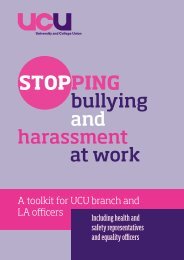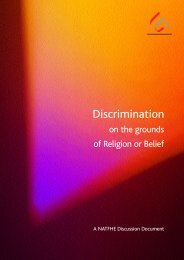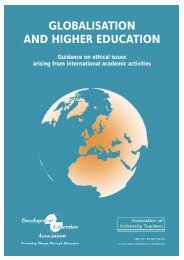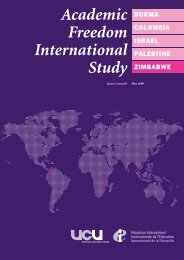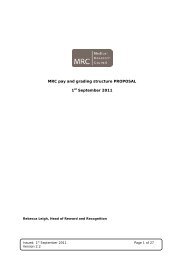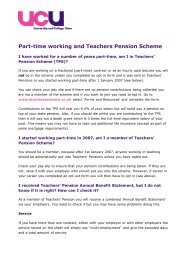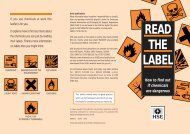a survey of stress and well-being among staff in higher ... - UCU
a survey of stress and well-being among staff in higher ... - UCU
a survey of stress and well-being among staff in higher ... - UCU
Create successful ePaper yourself
Turn your PDF publications into a flip-book with our unique Google optimized e-Paper software.
excellence <strong>in</strong> a number <strong>of</strong> areas has compounded the <strong>stress</strong> experienced by<strong>staff</strong> (Hazelkorn, 2011). Market-led policies <strong>and</strong> globalisation necessitateregular curriculum redesign <strong>and</strong> diverse modes <strong>of</strong> delivery, which requireenhanced pr<strong>of</strong>essional <strong>and</strong> technical skills from academic <strong>and</strong> support <strong>staff</strong>.Enhanced regulatory dem<strong>and</strong>s <strong>and</strong> performance management structuresrelat<strong>in</strong>g to teach<strong>in</strong>g <strong>and</strong> research have been <strong>in</strong>troduced. Staff employed <strong>in</strong>universities <strong>and</strong> colleges have experienced <strong>in</strong>creased dem<strong>and</strong>s for excellence<strong>in</strong> teach<strong>in</strong>g, adm<strong>in</strong>istration <strong>and</strong> pastoral care, as <strong>well</strong> as more pressure to boostfund<strong>in</strong>g through entrepreneurial activities (CHERI, 2007). Universities are als<strong>of</strong>orced to compete more fiercely for research grants <strong>and</strong> the forthcom<strong>in</strong>gResearch Excellence Framework requires academic employees to not onlyproduce excellent research, but evidence its broad impact.Fixed-term or other forms <strong>of</strong> casual contracts for <strong>staff</strong> <strong>in</strong> <strong>higher</strong> education arewidespread - particularly for research-only academic <strong>staff</strong>. In <strong>higher</strong> education<strong>in</strong> the UK <strong>in</strong> 2011-12, accord<strong>in</strong>g to the Higher Education Statistics Agency’sStaff Record, analysed by University <strong>and</strong> College Union, 36% <strong>of</strong> all academics,<strong>in</strong>clud<strong>in</strong>g 60% <strong>of</strong> teach<strong>in</strong>g-only <strong>staff</strong> <strong>and</strong> 68% <strong>of</strong> research-only <strong>staff</strong>, were onfixed-term contracts - a factor likely to have impacted on perceptions <strong>of</strong> jobsecurity. The trend towards greater rationalisation <strong>of</strong> universities <strong>and</strong> collegesthrough closure <strong>and</strong> merger is likely to cont<strong>in</strong>ue (CHERI, 2011). High levels <strong>of</strong>job <strong>in</strong>security have been found <strong>in</strong> previous studies <strong>of</strong> <strong>UCU</strong> members (K<strong>in</strong>man &Jones, 2004; Court & K<strong>in</strong>man, 2009a, 2009b, 2009c). Job <strong>in</strong>security has alsobeen cited as a considerable source <strong>of</strong> <strong>stress</strong> <strong>in</strong> <strong>UCU</strong> members <strong>and</strong> othersamples <strong>of</strong> university <strong>and</strong> college employees (K<strong>in</strong>man & Jones, 2004;Tytherleigh, Webb, Cooper & Ricketts, 2005).Research conducted over the last 10 to 15 years <strong>in</strong>dicates that levels <strong>of</strong> psychologicaldi<strong>stress</strong> <strong>among</strong>st employees <strong>in</strong> post-compulsory education arecomparatively high. The f<strong>in</strong>d<strong>in</strong>gs <strong>of</strong> a systematic review conducted by Watts <strong>and</strong>Robertson (2011) highlighted levels <strong>of</strong> burnout <strong>among</strong>st university teach<strong>in</strong>g<strong>staff</strong> compara-ble with ‘at risk’ groups such as healthcare pr<strong>of</strong>essionals.Academics engaged <strong>in</strong> teach<strong>in</strong>g <strong>and</strong> research, rather than those who are justteachers or researchers, tended to report the highest levels <strong>of</strong> <strong>stress</strong> (W<strong>in</strong>efield& Jarrett, 2001). Two UK <strong>survey</strong>s <strong>of</strong> academic <strong>and</strong> academic-related <strong>staff</strong>conducted <strong>in</strong> 1998 <strong>and</strong> 2004 1 found high levels <strong>of</strong> job-related <strong>stress</strong>ors <strong>and</strong> alevel <strong>of</strong> psychological di<strong>stress</strong> that exceeded that reported by other pr<strong>of</strong>essionalgroups (K<strong>in</strong>man, 1998; K<strong>in</strong>man & Jones 2004; K<strong>in</strong>man et al., 2006). The most<strong>stress</strong>ful aspects <strong>of</strong> work <strong>in</strong>cluded rushed pace <strong>of</strong> work, <strong>in</strong>adequateadm<strong>in</strong>istrative <strong>and</strong> technical support, lack <strong>of</strong> respect <strong>and</strong> esteem, too muchadm<strong>in</strong>istrative paperwork, poor promotion opportunities, <strong>in</strong>effectivecommunication, <strong>and</strong> lack <strong>of</strong> opportunity for scholarly work. Levels <strong>of</strong> many <strong>of</strong>these <strong>stress</strong>ors rema<strong>in</strong>ed high <strong>in</strong> the sector <strong>in</strong> the six year period between1998 <strong>and</strong> 2004 (K<strong>in</strong>man et al., 2006).1 Surveys <strong>of</strong> members <strong>of</strong> the Association <strong>of</strong>University Teachers.The study conducted <strong>in</strong> 2004 revealed that a considerable proportion <strong>of</strong> members<strong>of</strong> the Association <strong>of</strong> University Teachers were work<strong>in</strong>g <strong>in</strong> excess <strong>of</strong> the 48hour weekly limit set by the European Union’s Work<strong>in</strong>g Time Directive (HMSO,1998). More specifically, 59% <strong>of</strong> respondents employed on a full-time basis6


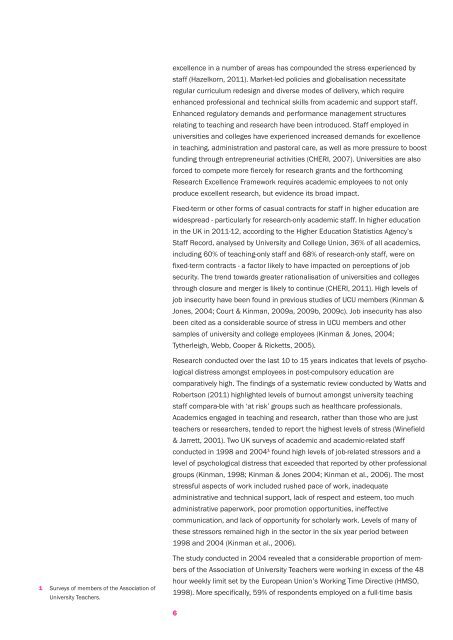
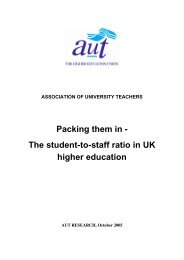
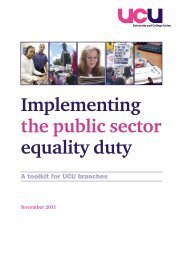
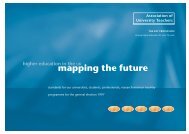
![(.pdf) [29kb] - UCU](https://img.yumpu.com/50914942/1/184x260/pdf-29kb-ucu.jpg?quality=85)
